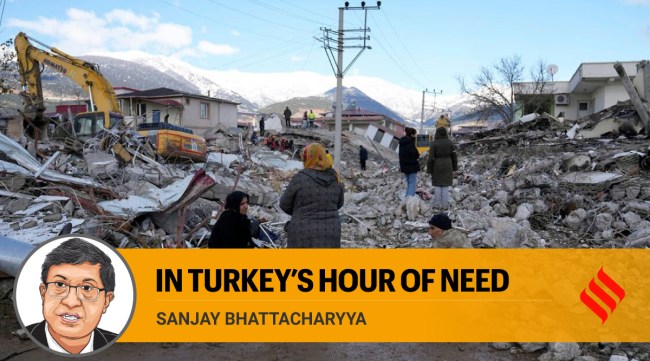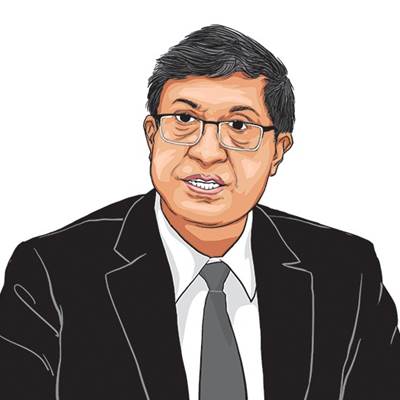Opinion Former ambassador to Turkey writes on the devastating earthquake: I feel a sense of personal pain and anguish
India is responding to the Turkish people in Kahramanmaraş in their hour of need through humanitarian assistance, a tradition that India and its civilisation have been known for, for ages.
 The Turkey earthquake measured a massive 7.8 on the Richter scale. (AP Photo)
The Turkey earthquake measured a massive 7.8 on the Richter scale. (AP Photo) The tremors came before dawn and the earth shook, like never before in living memory. The people of Kahramanmaraş, in southern Turkey, close to the Syrian border, were woken up abruptly, and before their eyes, their homes crashed to the ground. The earth was like the ocean in a tempest as waves rippled outwards, to the south towards Gaziantep and beyond to Aleppo in Syria, to the east towards Diyarbakır and Mardin, to the north towards Malatya, and to the west towards Osmaniye and Adana, bringing death and destruction in its wake to 10 provinces in Turkey and northern Syria. It was a horrific tragedy.
As relief workers and residents searched for survivors under the rubble, the weather was unforgiving, with snow and sleet adding to the misery. Even before people could recover from the first earthquake, which was a massive 7.8 on the Richter scale, there were over 50 aftershocks, with two particularly severe, of 6.7 and 6.0 on the Richter scale, compounding the severity of the calamity. Over 3,300 people have already lost their lives in Turkey and Syria and many more rendered homeless; unfortunately, the toll is expected to rise further.
I feel a sense of personal pain and anguish. From the time I served as the Ambassador of India to Turkey, I had many friends in the region, who maintained business and cultural connections with India. I also travelled extensively in the region and savoured its culture, meeting wonderful people. The region has been at the crossroads of civilisation for millennia with historical sites dating back to the Hittite, Greek, Roman, Persian, Arab and early Turkish periods. They possess a composite culture and embrace different faiths. There is an urgent need to combine all efforts to bring succour to the people who face a human tragedy, in this terrible hour.
Turkish President Recep Tayyip Erdoğan called it the country’s largest disaster since 1939 (when a terrible earthquake hit Erzincan, in eastern Turkey, claiming over 32,000 lives). Seven days of national mourning have been declared. Turkey’s efficient Disaster and Emergency Management Authority (AFAD) and the Turkish Red Crescent swung into search and rescue, and relief operations immediately. However, the scale of the disaster was much bigger than expected and Turkey reached out for international assistance. Similarly, on the Syrian side, the troubled areas bordering Turkey were severely affected, necessitating external assistance.
PM Narendra Modi responded immediately to the terrible disaster and tragedy following the earthquake. “India stands in solidarity with the people of Turkey and is ready to offer all possible assistance to cope with this tragedy”, the PM said. He added that he was deeply pained by the devastating earthquake that had also affected Syria and expressed a commitment to provide assistance and support to the Syrian people. A meeting chaired by Principal Secretary P K Mishra, which included representatives from the Ministry of External Affairs, Home and Defence and relief support agencies, reviewed the situation and prepared for humanitarian assistance.
India dispatched two units of NDRF, comprising more than 50 personnel, and specially trained dog squads with rescue machinery and medical supplies to the affected area to assist in the search and rescue and relief efforts. An 89-member medical team is also ready for deployment. Over the years, India has developed considerable experience and expertise in dealing with natural disasters and providing humanitarian assistance to affected countries. Apart from missions within the country, India provided humanitarian assistance teams in Fukushima, the Philippines, Aceh, Fiji, Myanmar and many other affected areas, and launched evacuation missions across the world, earning a reputation for being a reliable and effective first responder in situations needing disaster relief.
The humanitarian situation, caused by the earthquake, in the Turkey-Syria border areas is serious. The first few days are critical for search and rescue efforts to save lives. Shelters for humanitarian relief and medical assistance need to be established for those displaced by the earthquake. At the same time, planning for rehabilitation and livelihoods has to be put in place. The region has seen an influx of refugees and internally displaced persons due to the situation in Syria as well as in Kurdish areas. Moreover, the Turkish economy has been fragile and affected by high inflation and devaluation.
AFAD has a robust infrastructure, geared toward providing relief on the Turkish side. Their monitoring stations have collated long-term data on earthquakes and developed regulations for safe civil construction as well as emergency responses in case of natural disasters. They work efficiently with Red Crescent. However, in a calamity of this scale, they need external support to supplement their capacities and expertise.
Turkey is prone to earthquakes. The Anatolian plate is nestled between the Eurasian and African plates, as well as the minor Arabian and Aegean plates. This causes frequent earthquake activity as the tectonic plates shift. The North Anatolian fault line is particularly vulnerable. Turkey experienced several major earthquakes recently, including one of 7.0 scale in 1999 in Duzce, near Istanbul, and another of 7.1 in 2011 in Van, eastern Turkey, resulting in enormous loss of lives.
Kahramanmaraş, the epicentre of the recent earthquake, is well-known as the home of dondurma, which is traditional Turkish ice cream. Dondurma is a sticky ice cream, often made from goat milk, with added salep, a powder extracted from orchids. Turkish dondurma found its way into our hearts when a Kahramanmaraş ice cream maker provided free dondurma to the participants of the “Glimpses of India” painting competition, held for Turkish schoolchildren in 2019. They subsequently set up a joint venture for the production of dondurma in India. India is now responding to the Turkish people in Kahramanmaraş in their hour of need through humanitarian assistance, a tradition that India and its civilisation have been known for, for ages.
The writer is a former Indian ambassador to Turkey





